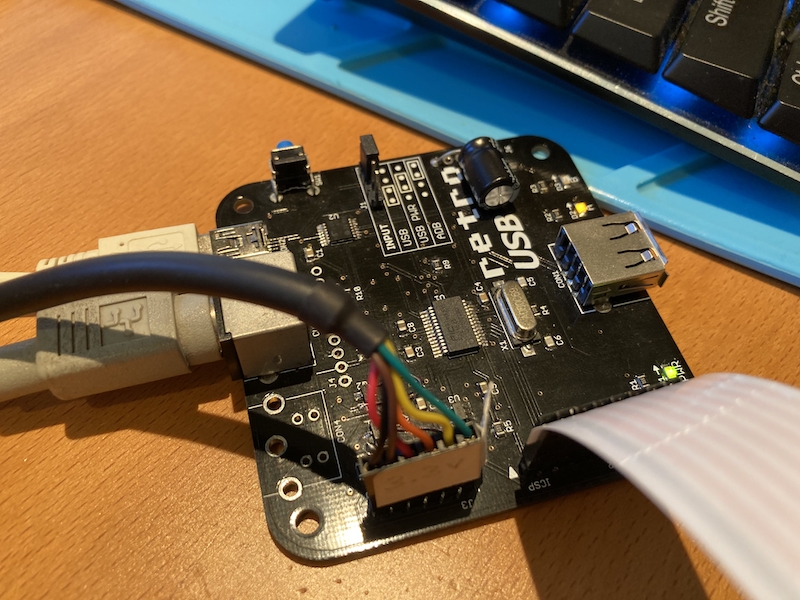Archive for the 'USB Wombat' Category
ADB-USB Wombat Firmware 0.3.7
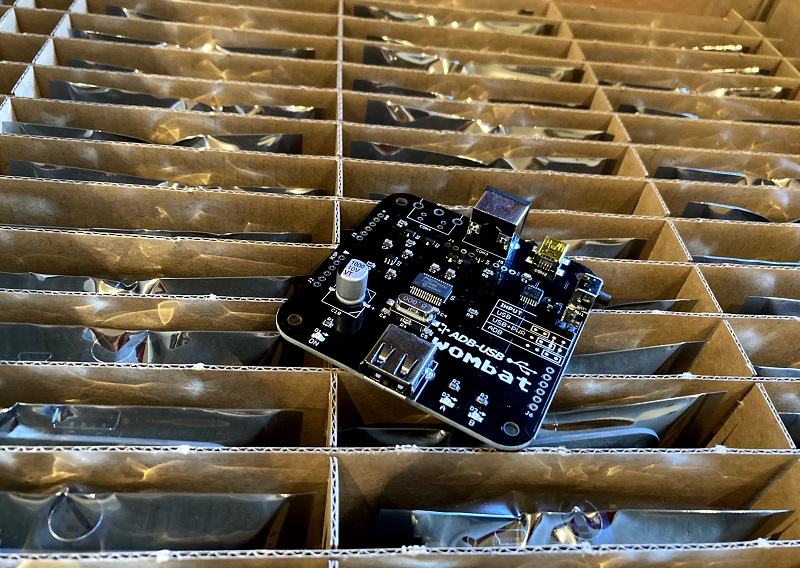
Firmware version 0.3.7 is now available for the Wombat ADB-to-USB input converter. This version fixes a compatibility problem with some ADB mice that use non-standard communication timing. You can download the new firmware here.
This was an interesting discovery. Apple only ever produced a few different ADB mice, with model numbers A9M0331, M2706, and G5431. You might think that mice with the same model number would be the same, but in fact there are several different versions of each model and they have very different internal parts. It may be possible to tell them apart by checking the country of manufacture printed on the mouse, which could be USA, China, Malaysia, Taiwan, or others.
Some of the “Made in Taiwan” ADB mice have a controller chip inside that’s made by Logitech rather than Apple. These mice communicate over ADB at 75 microseconds per bit, instead of at the normal rate of 100 microseconds per bit. A small change to the Wombat firmware was required to make it more flexible about the bit timing.
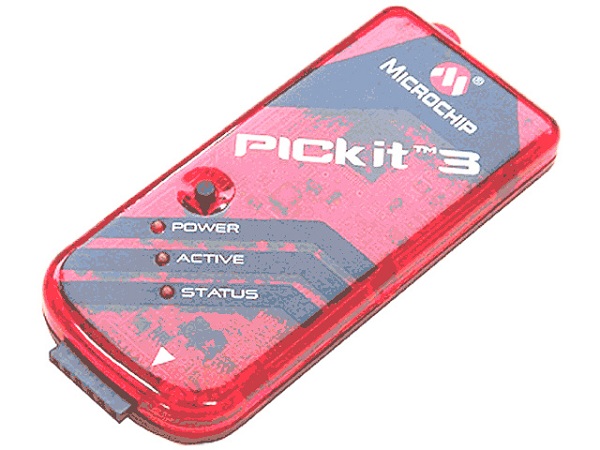
PICkit 3 R.I.P.
The Wombat is designed around a Microchip PIC32 microcontroller, and I use a Microchip PICkit 3 to program and debug. Somewhere within the last year or so, the PICkit 3 has basically stopped working. It gives every indication of being some kind of Windows 10 problem or USB driver issue, rather than a hardware problem with the PICkit 3. Searching the web turns up many similar complaints, but no solution.
Using Microchip’s MPLAB X IDE for development and debugging, the PICkit 3 doesn’t work at all. The IDE will detect that it’s there, but any attempt to actually use it just gets a “connection failed” error. This means that I can’t use the debugger, and I’m reduced to debugging using print statements over the serial port.
The PICkit 3 sort-of works with the MPLAB IPE, a stand-alone programming tool with no debugging capabilities. But it only works for a short window of time after rebooting my computer. After a few programming cycles, it falls back to the same “connection failed” behavior as the IDE. The only way I’ve found to fix it is to reboot… again. Unplugging and replugging the PICkit3 doesn’t help, nor does updating the PICkit 3’s firmware, restarting MPLAB, or anything else I can think of. The word from Microchip’s own support is basically “Oh, you bought one of THOSE? Ha ha ha. Yeah, those PICkit 3s don’t work very well and we’ve dropped support for them.”
After spending quite a long time trying to resolve this, I eventually gave up, and decided I won’t be using any PIC parts for any future projects. The tools are just too clunky and buggy, and there doesn’t seem to be nearly as large of a community using PIC32 parts as other options like STM32. That means that when something’s not working, there aren’t many people who can offer help, and you’re basically out of luck. Too bad.
Read 3 comments and join the conversationADB-USB Wombat Update – Power Key Fix
Hi! This is Alice. I’ll be helping out with some of the engineering work at BMOW.
Version 0.3.6 for the ADB-USB Wombat is now available. The Wombat is a bidirectional ADB-to-USB and USB-to-ADB converter for keyboards and mice. Connect modern USB keyboards and mice to a classic ADB-based Macintosh, Apple IIgs, or NeXT, or connect legacy ADB input hardware to a USB-based computer running Windows, OSX, or Linux.
The new version fixes a small bug with the Power Key in ADB to USB mode. This fix enables the Wombat to register the Power Key being held at the same time as another key, allowing it to be useful in different mappings such as a Fn key.
The Wombat is available now on the BMOW store!
Read 2 comments and join the conversationADB-USB Wombat Restock, and Global Shipping
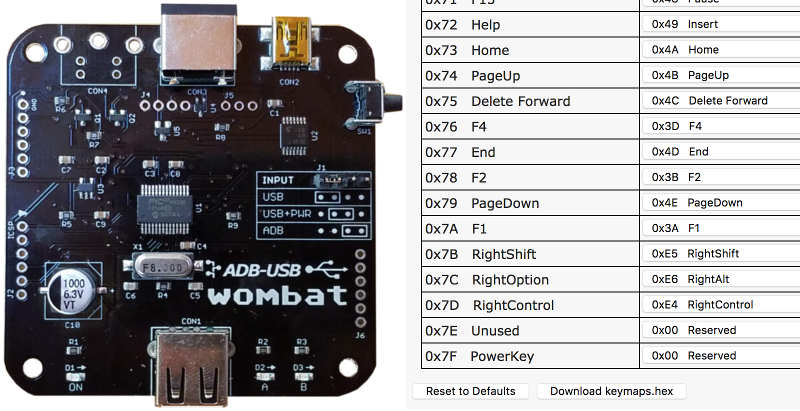
The Wombat ADB-USB input converter is now back in stock at the BMOW Store. Thanks for everybody’s patience while we waited out multiple delays on delivery from my manufacturing partner. There’s now plenty of Wombat stock at BMOW HQ, so they won’t be selling out again any time soon.
What’s a Wombat? The Wombat is a bidirectional ADB-to-USB and USB-to-ADB converter for keyboards and mice, and was developed by Steve Chamberlin here at Big Mess o’ Wires. It can connect modern USB keyboards and mice to a classic ADB-based Macintosh, Apple IIgs, or NeXT, or connect legacy ADB input hardware to a USB-based computer running Windows, OSX, or Linux. For more details, please see the product description page.
Global Shipping is Back!

After ten days of confusion at the hands of US Customs and Export Control, BMOW global shipping is back! They’ll be celebrating from Calgary to Cardiff, Melbourne to Madrid. I never did get a clear explanation of exactly what went wrong, but some post office processing facility at the San Francisco International Distribution Center screwed up in a big way, resulting in thousands of international packages being incorrectly returned to sender from shippers all over the US West Coast. What a mess.
I’ve taken this opportunity to adjust the international shipping rates to reflect the latest USPS First Class Package International service rates. Pop quiz: what do France, Germany, the Czech Republic, Gibraltar, Hungary, Iceland, Lithuania, Poland, and Portugal all have in common? They’re nine countries whose USPS rate group offers cheaper shipping than most other international destinations outside North America. Why those nine countries? I really have no idea.
Can you guess what distinction is shared by Australia, New Zealand, Brazil, Hong Kong, South Korea, and Japan? Shipping to those six countries is more expensive than most of the rest of the world. I can sort of understand Australia and New Zealand due to their relative geographic isolation, but why single out Brazil or Japan? The lesson I’ve learned from these past ten days is never question the post office.
I’m looking forward to shipping lots more BMOW hardware to enthusiasts everywhere.
Read 2 comments and join the conversationAcrylic Cases Back in Stock
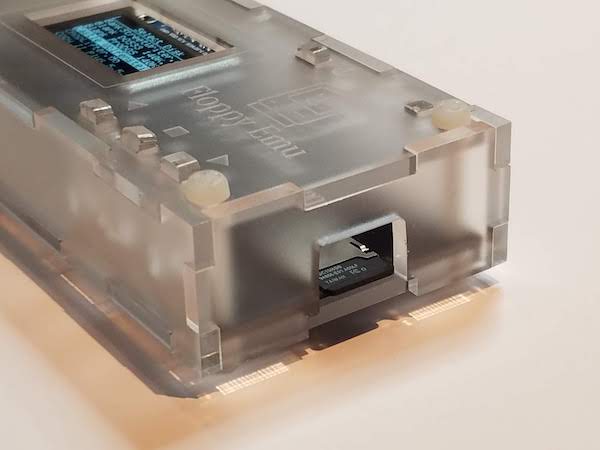
Acrylic cases for the BMOW Floppy Emu and ADB-USB Wombat are back in stock. If you’ve been waiting for one of these, your wait is over. The Floppy Emu cases were held up longer than expected due to international shipping delays, which continue to be a major challenge. The Wombat cases are made locally, but the manufacturer has mostly transitioned to making emergency medical protective equipment and is processing other work slowly. To compound the problem, the first delivery of Wombat cases were somehow mis-cut at 15/16ths the correct size. The whole batch had to be thrown in the trash, and new cases re-cut. Sometimes even the simple things are hard!
Read 3 comments and join the conversationNew Features for ADB-USB Wombat

New firmware 0.3.5 is now available for the ADB-USB Wombat! The Wombat is a bidirectional ADB-to-USB and USB-to-ADB converter for keyboards and mice. Connect modern USB keyboards and mice to a classic ADB-based Macintosh, Apple IIgs, or NeXT, or connect legacy ADB input hardware to a USB-based computer running Windows, OSX, or Linux.
Firmware version 0.3.5 adds some new items to the feature list:
- Support for remapping the Power Key for ADB-to-USB mode. This was a frequently requested feature from people using an old Apple Extended Keyboard with a modern PC or Mac. The default is unmapped, but you can use the Custom Keymap Tool to map it to a function key or anything else.
- Separate keycodes for left and right side Shift, Control, and Option keys. Now if you wish, you can configure the left modifier keys to have different behavior than the right modifiers. I’d thought this was already happening before, but some extra keyboard magic was needed to make it work. The Apple Extended Keyboard II supports separate left/right side modifiers, but the AEK I doesn’t. If you’ve got an Appledesign keyboard or other model, let me know how it behaves.
- Option to disable mouse-wheel arrow keys. When using a USB mouse on an ADB computer, there’s no equivalent of the mouse wheel. The Wombat converts mouse wheel rotations into keypresses of the up/down arrow key, which accomplishes a similar result in most software. If it causes problems, this arrow keys behavior can now be disabled using the Custom Keymap Tool.
You’ll find firmware 0.3.5 in the Downloads section of the Wombat page. And if you don’t have a Wombat yet, they are available and shipping now.
Read 2 comments and join the conversationWombat Released into the Wild
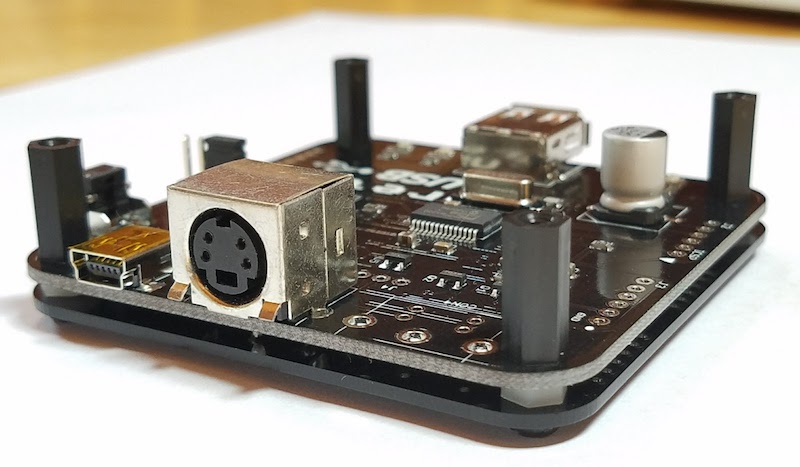
The Wombat ADB-USB input converter is now back in stock at the BMOW Store. Head there to get yours now.
Wombat what? The Wombat is a bidirectional ADB-to-USB and USB-to-ADB converter for keyboards and mice, and was developed by Steve Chamberlin here at Big Mess o’ Wires. Connect modern USB keyboards and mice to a classic ADB-based Macintosh, Apple IIgs, or NeXT machine. Or connect legacy ADB input hardware to a USB-based computer running Windows, OSX, or Linux. No special software or drivers are needed – just plug it in and go. For more details, please see the product description page.
Read 4 comments and join the conversation

